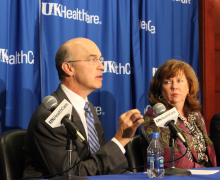UK Medical Student's Career Turnabout Follows Family Tradition
After obtaining an undergraduate degree from Vanderbilt University, landing a graduate research position at Georgia Tech, and designing jet engine acoustics as a consultant for the Federal Aviation Administration and NASA, Ben Havrilesko decided to plot a new career course.
Wearing light blue scrubs and toting medical science texts across campus, the first-year medical student is today immersed in the mechanics of the human body. When asked about life before medical school, Havrilesko clarifies some misconceptions about his former role as an aeronautical engineer
Academic Convocation and Awards Day
Academic Convocation and Awards Day was held on Wednesday, October 8, 2014, in the UK Chandler Hospital Pavilion H Auditorium. Academic Convocation is an annual presentation of awards to students and faculty for outstanding achievement in academics, service, research and teaching during the previous year. The Edwin Munich Memorial Lecture presented by Dr. David J. Moliterno, Jack M. Gill Professor and Chairman of Internal Medicine and Vice Dean for Clinical Affairs, was titled “The Crucial Role of Medical Education in the Evolution of Contemporary Healthcare.”
VIDEO: $14.9 Million Research Project to Study Care Transitions
Revised Individual Development Plans for Trainees
Dear Chairs and Center Directors,
In response to feedback about the draft IDP, we have created a slightly modified version, which is attached. The major change in this version is the specific inclusion of questions in Parts II and III related to understanding responsible conduct of research, in order to ensure that our training plans are meeting with NIH standards in this area. In addition, we slightly modified the introductory paragraph so that it can be directly cut and pasted into a progress report. This section now reads:
NIH Safety Stand Down Response
[From VPR Office]
As a result of recent lapses in biosafety practices at Federal laboratories, the Federal Government has issued a “Safety Stand-Down” for federal facilities to ensure safety of laboratory researchers and the American public. The University of Kentucky as a recipient of Federal research funding is encouraged to conduct similar reviews.
Next Lunch at Leader Announced by Sponsored Research Administrative Services
Have you submitted a proposal or do you plan to do so in the next few months?
NIH Operates Under a Continuing Resolution
[From NIH Website]
Bosomworth Leaves Behind Extraordinary Legacy
UK Delegation Attends Second Annual SEC Symposium
Project ACHIEVE Approved for $14.9 Million Research Award
Center for Health Services Research Approved for $14.9 Million Research Award by the Patient-Centered Outcomes Research Institute to Study Transitions from Hospital to Home
A research team at the University of Kentucky Center for Health Services Research has been approved for a $14.9 million research funding award by the Patient-Centered Outcomes Research Institute (PCORI) to study the challenges of patients making smooth transitions from the hospital to home.


